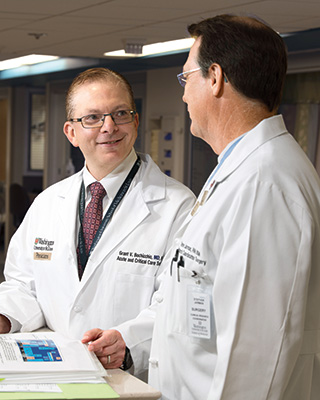Continuous glucose monitor aides ICU care

High blood sugar occurs frequently in critically ill patients, resulting from metabolic and hormonal changes that accompany the body’s response to injury and stress. It is also associated with poor clinical outcomes, including infections and other complications, increased hospital length of stay, and death.
To date, measuring high blood sugar in the intensive care unit (ICU) has been a moving target; it takes time to draw blood and get lab results, and the patient’s blood glucose level may change in the interim.
Because of that imprecision and the risk of triggering low blood sugar, many ICUs have moved away from aggressive blood-sugar control, says Grant Bochicchio, MD, MPH, section chief and the Harry Edison Professor of Surgery. To provide a viable solution, his lab has worked intensively over the past decade with U.S-based OptiScan Biomedical Corporation to create a bedside continuous glucose monitor. He led a recent multicenter trial that found the device to be safe and accurate, and the company has applied for FDA approval.
“Currently, because it takes time to get lab results, you’re treating the patient based on their blood glucose levels from hours ago rather than what it is right now,” says Bochicchio. “Using mid infrared spectroscopy, the new bedside device draws and measures the patient’s blood every 15 minutes and provides an immediate reading. It improves patient care and decreases nurses’ workload.”
Bochicchio says similar point-of-care monitors have been used for years in ICUs. But they do not provide continuous readings and have been shown to be inaccurate in critically ill patients because of this population’s anemia and heavy medication. In the current study, the new device outperformed these point-of-care monitors on every 1- to 3-hour glucose measurement.
Bochicchio reported the trial’s findings in the Journal of Trauma and Acute Care Surgery in June 2017. Other participating centers were Tufts University in Boston, Memorial Hermann Hospital in Houston and Starwood Cardiac Group in Portland, Ore.
Bochicchio is working with OptiScan to test the monitor’s use in measuring lactate and eventually other substances. Controlling lactate levels is a major goal of preventing septic shock, a life-threatening condition that occurs when blood pressure drops dangerously low after infection.
Grant Bochicchio, MD, MPH, consulted with OptiScan Biomedical Corporation on FDA submission of the bedside continuous glucose monitor.
Highlights

A STUDY OF NEARLY 50,000 sepsis patients confirmed the importance of rapid diagnosis and treatment for this life-threatening condition. Sepsis, the body’s toxic response to infection, is the leading cause of death in hospitals. Tiffany Osborn, MD, MPH, co-authored the study, which analyzed patients from 149 hospitals in New York state treated between April 2014 and June 2016. Published in the New England Journal of Medicine, it found that for each hour treatment is delayed, a patient’s risk of death jumps 4 percent. Osborne also has worked to establish sepsis treatment protocols, educational campaigns and policy initiatives to reduce incidence. She and John Mazuski, MD, PhD, were among many authors of new international guidelines, called Surviving Sepsis Guidelines 2016, jointly published by the Society of Critical Care Medicine and the European Society of Intensive Care Medicine.
JOHN MAZUSKI, MD, PHD, completed his term as president of the Surgical Infection Society by hosting the organization’s 37th annual meeting in St. Louis in May 2017. Members of the Acute and Critical Care Surgery Section gave eight presentations, and Isaiah Turnbull, MD, PhD, and Christopher Horn, MD, each won awards.
THE SECTION EXPANDED its surgical services at Christian Hospital in north St. Louis County by adding surgeons Nishant Raj, MD, and Muhammad Yasin, MD, formerly employed by the non-profit health care organization BJC HealthCare. They join Stephen Eaton, MD, and Bradley Freeman, MD, to offer a wide range of general and colorectal surgeries to an underserved area.
Noted accomplishment

JOHN MAZUSKI, MD, PHD, professor of surgery and co-director of the Barnes-Jewish Hospital Surgical Intensive Care Unit, concluded an active presidency of the Surgical Infection Society (SIS) in May 2017. He was part of a task force that wrote SIS Revised Guidelines on the Management of Intra-Abdominal Infection and was the SIS representative for the Surviving Sepsis Guidelines 2016, published jointly by the Society of Critical Care Medicine and European Society of Intensive Care.